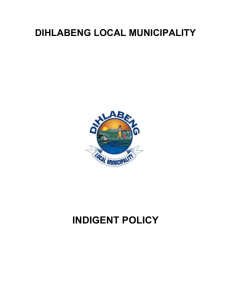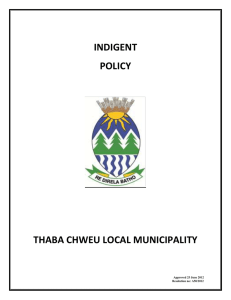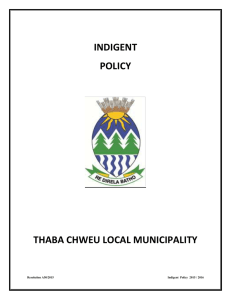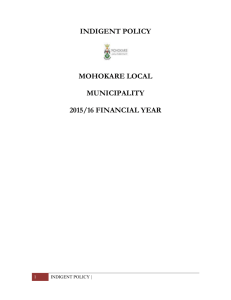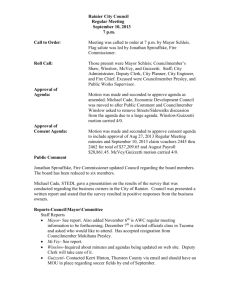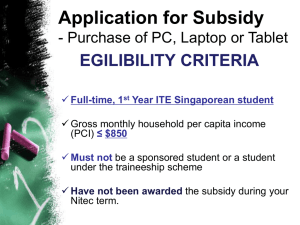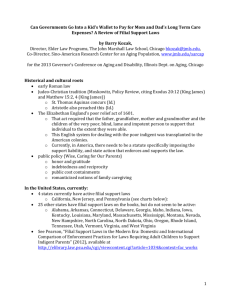INDIGENT HOUSEHOLD SUBSIDY POLICY AND PRINCIPLES
advertisement
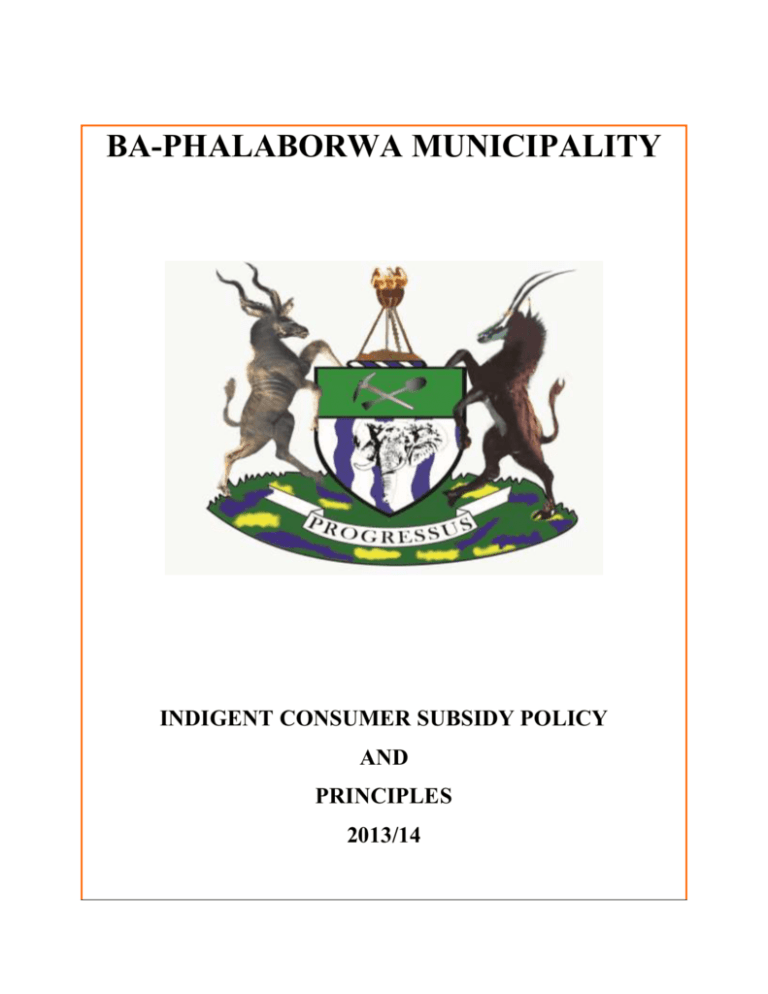
BA-PHALABORWA MUNICIPALITY INDIGENT CONSUMER SUBSIDY POLICY AND PRINCIPLES 2013/14 1. INTRODUCTION 1.1 The Municipal Council must give priority to the basic needs of the community, promote the social and economical development of the community and ensure that all residents and communities in the municipality have access to at least the minimum level of basic municipal services in terms of Section 152(1) (b) and 153(b) of the Constitution. 1.2 The Council accepts that they are responsible for the rendering of services in terms of schedules 4 and 5 of the Constitution as well as other services which may be delegated by National and Provincial Government. The Council will endeavour to render a basic level of services necessary to ensure an acceptable and reasonable quality of life and which takes into account health and environmental considerations. No residents should receive any service below the minimum level of services. 1.3 In terms of section 74 of the Local Government Municipal Systems Act 2000, as amended, a Municipal Council must adopt and implement a Tariff Policy. In terms of section 74(i) of the Act, in adopting a Tariff Policy, the Council should at least take into consideration the extent of subsidisation of tariffs for poor household consumers. Arising from the above, Council needs to approve an Indigent Support Policy. This policy must provide procedures and guidelines for the subsidisation of basic services and tariff charges to its indigent household consumers. 1.4 Services are generally regarded as to have access to electricity, access to clean water within a reasonable distance of one’s dwelling, basic sanitation, solid waste removal and access to and availability of roads. 1.5 The key purpose of an indigent subsidy policy is to ensure that household consumers with no or lower income (qualifying as indigents) are not denied a reasonable basic services and that the municipality is not financially burdened with non-payment of services. 1.6 Provided that grants are received and funds are available, the indigent subsidy policy should remain intact. 1.7 To achieve the purpose it is important to set a fair threshold level, and then to provide a fair consistent and sustainable subsidy of tariffs. 1.8 The consumer, in order to qualify as an indigent, needs to complete the necessary documentation as required and agree to regulations and restrictions stipulated by BaPhalaborwa Local Municipality. 1.9 A consumer qualifying for indigent support will receive the following subsidies as determined annually during the preparation of the municipality’s budget and approved by council:Services Destitute Indigent Indigent Water Maximum of 6 kl Maximum of 6 kl Electricity (pre-paid and conventional) 50 kWh 50 kWh Sewer Fully subsidised Fully subsidised Refuse Fully subsidised Fully subsidised Indigent Household Subsidy Policy and Principles 2013/14 Page 2 Assessment Rates Fully subsidised Fully subsidised 2. PURPOSE OF THE POLICY 2.1 The purpose of the Indigent Consumer Policy is to ensure the following: 2.2 The Council also recognises that many of the residents can simply not afford the cost of full provision and for this reason the Council will endeavour to ensure affordability through: 3. The provision of basic services to the community in a sustainable manner, within the financial and administrative capacity of the Council; and To provide procedures and guidelines for the subsidisation of basic service charges to its indigent household consumers, using the Council’s budgetary provisions received from National Government, according to prescribed policy guidelines. Setting tariffs in terms of the Councils Tariff Policy, which will balance the economic viability of continued service delivery; and Determining appropriate service levels. RESPONSIBILITY / ACCOUNTABILITY The Council has the overall responsibility for laying down the Indigent Consumer Support Policy. 4. INDIGENT CONSUMER SUPPORT POLICY PRINCIPLES The following should be the guiding principles in implementing the Indigent Consumer Support Policy:- 4.1 The Indigent Consumer Support Policy is in accordance with the Local Government Municipal System Act of 2000, as amended and other related legislation. 4.2 Relief will be provided by the Council to registered residential consumers of services. 4.3 The Council must, wherever possible, ensure that any relief is constitutional, practical, fair, equitable and justifiable to avoid alienating any group of household consumers. There should be no differentiation whatsoever of any residential consumers, except in the level of service rendered. 4.4 The subsidy for minimum service levels should not result in the creation of a massive bureaucratic administration that would not be cost effective to implement. 4.5 Differentiation must be made between those household consumers who cannot afford to pay for basic services and those who just do not want to pay for these services. 4.6 It should be based on a predetermined period or financial year. 4.7 The Indigent Consumer Support Policy will prevail as long as funds are available. 4.8 The Council may review and amend the qualification for indigent consumer support annually or anytime at its sole discretion. Indigent Household Subsidy Policy and Principles 2013/14 Page 3 4.9 The collective or joint gross income of all the occupants on a residential stand will be taken into account. The total household income must be correctly reflected on the application form requesting indigent support. 4.10 Council reserves the right to assess the collective or joint value of immovable assets of the applicants and spouses in order to qualify. 4.11 If a person qualifies to be indigent, they should be registered on a database linked to the debtors system to ensure cost effective and efficient management of it. 4.12 The residents must formally apply on the prescribed application form for the relief and will qualify for the indigent support according to the prescribed criteria/principles laid down by the Council. After the application form has been completed, an effective and efficient evaluation system should be used in order to obtain the outcome within a reasonable time determined by the Council. 4.13 The onus is on the recipient to immediately inform the Council of any change in his/her status or personal household circumstances. 4.14 Disciplinary measures decided by the Council, should be imposed on people who misuse the system and provide incorrect information. 5. CRITERIA FOR IDENTIFICATION TO QUALIFY FOR INDIGENT SUPPORT 5.1 Grants-in-aid may, within the financial ability of the municipality, be allocated to owners or tenants of premises who receive electricity (either from council or directly from Eskom), water, sanitation, refuse removal, or assessment rate services from the Municipality, in respect of charges payable to the municipality for such services (this may be done in the form of write off, rebate or otherwise). 5.2 DISTINCTION OF INDIGENT CONSUMERS These grants may be allocated if such a person or any other occupier of the property concerned can submit proof or declare under oath that all occupants over 18 years of age or in the case of child headed household consumers had no income or a verified total gross monthly income of less than the amount indicated in terms of the definitions below for the preceding three consecutive months. 5.2.1 Definition of a Destitute Indigent: Is a household consumer whose total income of all occupants is not more than an amount as determined by the Council from time to time. Currently, this amount is deemed to be equal to or less than the amount received by one state pensioner. 5.2.2 Definition of an Indigent: Is a household consumer whose total income of all occupants is more than the amount determined for a destitute indigent and less than an amount as determined by the Council from time to time. Currently, this amount is deemed to be equal to or less than the amount received by two state pensioners. 5.3 Only one application per person (household consumer) in respect of one property only shall qualify for consideration. A business, school, body association, club or governing body shall not qualify for consideration. Indigent Household Subsidy Policy and Principles 2013/14 Page 4 5.4 The subsidy will apply to the owner or tenant of the property concerned (not transferable). 5.5 The subsidy will not apply in respect of household consumers owning more than one property and who will therefore not be classified as indigent. 5.6 Where water consumption of an indigent consumer exceeds the limit subsidised, Council may install a flow control meter or prepaid meter if the indigent household account is overdue. 6. APPLICATION AND AUDIT FORM 6.1 An Application for Indigent Household Consumer Subsidy must be completed by all consumers who qualify in terms of this policy. 6.2 The account holder must apply in person and must present the following certified copies of documents upon application: (a) (b) (c) (d) (e) (f) (g) (h) The latest Municipal account in his/her possession. The accountholder's and spouses identity documents. Written proof for child headed household consumers or properties inherited must be provided. An application form indicating the names and identity numbers of all occupants/residents over the age of 18 years, who reside at the property. Documentary proof of income or an affidavit of financial status. Statement of monthly income and expenditure. Bank statement for past three months of applicant and spouse where applicable. Any other proof or confirmation/ evidencing the qualification as indigent. 6.3 Application forms must be read in conjunction with the approved Council's indigent policy. All applications must be verified by an official or municipal agent appointed by Council. 6.4 The relevant Ward Councillor should assist during the evaluation and verification process of the application together with the relevant officials and local community leaders or ward committee members and or any person appointed by Council in this regard. 6.5 The list of indigent household consumers can be made available at any time to the Information Trust Corporation (ITC) for the purpose of exchanging credit information. 6.6 If an application is favourably considered, a subsidy will only be granted during that municipal financial year. The onus will rest on the approved account holders to apply for relief on an annual basis. 6.7 For the purposes of transparency, on an annual basis, the following key information of the recipient’s indigent support will be made available to the public for scrutiny: Names of household consumers receiving relief for the prescribed period; Stand number where services are rendered to the recipients; and And any other information that the municipality see to be in the public interest. 6.7.1 Any resident may query the qualification of a recipient in writing, within 30 days from the date of publication, to the Council or verbally for further investigation by council. 7. DRAFTING AND MAINTENANCE OF AN INDIGENT REGISTER Indigent Household Subsidy Policy and Principles 2013/14 Page 5 7.1 The Chief Financial Officer or his/her delegate will be responsible to compile and administer the database for household consumers registered in terms of this policy. 7.2 Council reserves the right to send officials or its agents to premises/household consumers receiving relief from time to time for the purpose of conducting an on-site audit of the details supplied. 8. PENALTIES AND DISQUALIFICATION FOR FALSE INFORMATION 8.1 Applicants will be required to sign and submit a sworn affidavit, to the effect that all information supplied is true and that all incomes, i.e. from formal and/or informal sources, are declared. 8.2 Any person who supplies false information will be disqualified from further participation in the subsidy scheme. He/she will also be liable for the immediate repayment of all subsidies received, reversal of any debt written off and the institution of criminal proceedings, as Council may deem fit. 8.3 When an indigent consumer fails to comply with the conditions stipulated to receive the subsidy, they will be dealt with in terms of the Council’s uniform credit control procedures. 8.4 The onus also rests on indigent support recipients to immediately notify Council of any changes in their indigence status, failure to notify Council will result in refusal for approval to be indigent consumer in future by council. 9. SERVICES TO BE SUBSIDISED 9.1 Electricity 9.1.1 All registered consumer indigents will receive 50kWh of electricity per month free of charge. Unused free electricity units will not be carried over to the next month. 9.1.2 Indigents who do not collect their free tokens at Eskom they will be taken off the Eskom roll and will have to re-register. Any meter tampering will result in the subsidisation to be withdrawn. 9.1.3 Where electricity is supplied by Eskom, the Council will enter into a service level agreement with Eskom to pay over the subsidy for indigent consumers qualifying in terms of this policy. 9.1.3 Council may grant subsidy up to 50% on connection fees, if the customer can satisfy beyond reasonable doubt that they cannot and won’t afford the full amount and its necessary that they be on prepaid. 9.2 Water 9.2.1 Indigent consumers registered will receive 6 kilolitres of water per month fully subsidised. 9.2.2 All registered indigents consumers will receive the first 6 kilolitres of water fully subsidised. 9.2.3 In the case of unmetered services the subsidy will be equal to the flat rate tariff applicable for that financial year. Indigent Household Subsidy Policy and Principles 2013/14 Page 6 9.2.4 A subsidy, determined at the beginning of every financial year and not more than the applicable tariff for that year, will be applied for the duration of that particular financial year. The amount of the subsidy will be determined and approved as part of the tariff policy applicable for the financial year. 9.3 Refuse Removal 9.3.1 All registered indigents shall be fully subsidised for refuse removal. 9.3.2 All registered indigents shall be subsidised for refuse removal as determined and provided for by the Council in the annual budget from time to time. 9.3.3 A subsidy, determined at the beginning of every financial year and not more than the applicable tariff for that year, will be applied for the duration of that particular financial year. The amount of the subsidy will be determined and approved as part of the tariff policy applicable for the financial year. 9.4 Sewerage 9.4.1 All registered indigent consumers shall be fully subsidised for sewerage services. 9.4.2 All registered indigent consumers shall be subsidised for sewerage services as determined and provided for by the Council in the annual budget from time to time. 9.4.3 A subsidy, determined at the beginning of every financial year and not more than the applicable tariff for that year, will be applied for the duration of that particular financial year. The amount of the subsidy will be determined and approved as part of the tariff policy applicable for the financial year. 9.5 Property Rates 9.5.1 All registered indigent consumers shall be fully subsidised for the payment of property rates. 9.5.2 All registered indigents shall be subsidised for the payment of property rates as determined and provided for by the Council in the annual budget from time to time. 9.5.3 A subsidy, determined at the beginning of every financial year and not more than the applicable tariff for that year, will be applied for the duration of that particular financial year. The amount of the subsidy will be determined and approved as part of the tariff policy applicable for the financial year. 10. TARIFF POLICY 10.1 The Local Government Municipal Systems Act 2000, as amended, stipulates that a Municipal Council must adopt and implement a tariff policy on the levying of fees for municipal services provided by the municipality itself or by way of service delivery agreements and which complies with the provisions of the Act and with any other applicable legislation. 10.2 A tariff policy must reflect, amongst others, at least the following principles, namely that:- Indigent Household Subsidy Policy and Principles 2013/14 Page 7 The amount individual users pay for their services should generally be in proportion to their use of that service; Poor household consumers must have access to at least basic services through tariffs that cover only operating and maintenance costs; special tariffs or life line tariffs for low levels of use or consumption of services or for basic levels of service; or Any other direct or indirect method of subsidisation of tariffs for poor household consumers. The extent of subsidisation of tariffs for poor household consumers and other categories of users should be fully disclosed. 11. SOURCES OF FUNDING 11.1 The amount of subsidisation will be limited to the amount of the equitable share received on annual basis. This amount may be varied on a yearly basis according to the new allocation for a particular financial year. 11.2 If approved as part of the tariff policy the amount of subsidisation may be increased through cross subsidisation, i.e. step tariff system. 11.3 The municipality may levy a fee to be paid monthly by all registered indigent. 12. METHOD OF TRANSFER AND THE VALUE OF THE SUBSIDY 12.1 No amount shall be paid to any person or body, but shall be transferred as a credit towards the approved account holder’s municipal services account in respect of the property concerned. 12.2 Where the supply is metered, a 100% subsidy of water with a concession of up to 6 kl, however, if consumption exceeds 6 kl per metering period (month) the consumer will be charged for actual consumption exceeding 6 kl at normal tariffs 12.3 Where the supply is not metered 100% subsidy on the flat rate charged. 12.4 The provisions of 12.3 above are subject to the proviso that the consumer agrees in writing that the supply of water to the applicable premises may be restricted by a flow control meter. 12.5 The municipality may install a prepaid electricity meter where a consumer is provided with free basic electricity by the Municipality. Such a consumer must agree to the installation of a prepaid electricity meter where one has not already been installed. 13. ARREAR ACCOUNTS 13.1 The arrears on the accounts of household consumers, approved as indigent, will be submitted to Council to be written off in full (including any interest charged).This submission will only be valid as a once-off exercise after approval and will not be applicable for future consumption in excess of the approved subsidy accumulated. 13.2 The municipality may re-instate the debt or reverse the write off, where a person after qualifying as an indigent sell the property for the period they are indigents. This shall mean that the outstanding debt may be required to be paid in full pending clearance. Indigent Household Subsidy Policy and Principles 2013/14 Page 8 14. RESTORING SERVICES TO QUALIFIED HOUSEHOLD CONSUMERS 14.1 If an application is approved services will be restored free of charge. If services are to be suspended thereafter in terms of the approved credit control policy the approved tariff for reconnection will be payable. 15. SERVICES IN EXTENT TO AVAILABLE SUBSIDY 15.1 Where restriction of consumption applies to a particular service, applicants may not refuse to be restricted in terms of Council policy. Where restrictions are not possible the account holder will be responsible for the consumption in excess of the approved subsidy. 16. CREDIT CONTROL POLICY TO BE APPLIED FOR INDIGENT HOUSEHOLD CONSUMERS 16.1 Aims of the Policy 16.1.1 The credit control policy aims to achieve the following: To distinguish between those who can and cannot genuinely pay for services; To get those who cannot pay to register with the municipality so that they could be given subsidies; To enable the municipality to determine and identify defaulters to ensure appropriate credit control procedures; and To establish an indigent directory of all persons who complies with the policy. 16.2 Obligation to Pay 16.2.1 The policy on provision of services should endeavour to provide services in accordance with the amount available for subsidisation. 16.2.2 It is however important to note that the subsidy received, in the majority of cases, does not cover the full account. In such event the consumer is still responsible for the balance between the full account and the subsidy received. 16.2.3 Where a consumer does not qualify as an indigent debtor in terms of additional consumption, credit control procedures must still be applied, in accordance with the approved credit control policy, for these outstanding amounts. 17. IMPLEMENTATION AND REVIEW OF THIS POLICY 17.1 This policy shall be implemented once approved by Council. All future applications for indigent registrations must be considered in accordance with this policy. 17.2 In terms of section 17(3) (e) of the MFMA this policy must be reviewed on annual basis and any proposed amendments tabled to Council for approval as part of the budget process. 17.3 In order to ensure the effective implementation of the policy, the following should form part of the roll out of the registration process:- 17.3.1 Publishing of the registration process, in local news papers, municipal account, flyers and posters. 17.3.2 Communication through local and regional radio stations. Indigent Household Subsidy Policy and Principles 2013/14 Page 9 17.3.3 Informing non governmental organisations, community based organisations, religious organisations about criteria and programme. 17.3.4 Role of ward councillors and committees in the registration and verification process. 17.3.5 Chief Financial Officer/ Revenue Manager to appoint a project manager and team to drive the programme. Indigent Household Subsidy Policy and Principles 2013/14 Page 10
